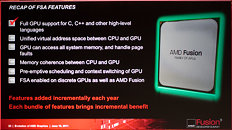Friday, June 17th 2011

AMD Charts Path for Future of its GPU Architecture
The future of AMD's GPU architecture looks more open, broken from the shackles of a fixed-function, DirectX-driven evolution model, and that which increases the role of GPU in the PC's central processing a lot more than merely accelerating GPGPU applications. At the Fusion Developer Summit, AMD detailed its future GPU architecture, revealing that in the future, AMD's GPUs will have full support for C, C++, and other high-level languages. Integrated with Fusion APUs, these new number-crunching components will be called "scalar co-processors".
Scalar co-processors will combine elements of MIMD (multiple-instruction multiple-data,) SIMD (single-instruction multiple data), and SMT (simultaneous multithreading). AMD will ditch the VLIW (very long instruction word) model that has been in use for several of AMD's past GPU architectures. While AMD's GPU model will break from the shackles of development that is pegged to that of DirectX, it doesn't believe that APIs such as DirectX and OpenGL will be discarded. Game developers can continue to develop for these APIs, and C++ support is more for general purpose compute applications. That does, however, create a window for game developers to venture out of the API-based development model (specifically DirectX). With its next Fusion processors, the GPU and CPU components will make use of a truly common memory address space. Among other things, this eliminate the "glitching" players might sometimes experience when games load textures as they go over the crest of a hill.
Source:
TechReport
Scalar co-processors will combine elements of MIMD (multiple-instruction multiple-data,) SIMD (single-instruction multiple data), and SMT (simultaneous multithreading). AMD will ditch the VLIW (very long instruction word) model that has been in use for several of AMD's past GPU architectures. While AMD's GPU model will break from the shackles of development that is pegged to that of DirectX, it doesn't believe that APIs such as DirectX and OpenGL will be discarded. Game developers can continue to develop for these APIs, and C++ support is more for general purpose compute applications. That does, however, create a window for game developers to venture out of the API-based development model (specifically DirectX). With its next Fusion processors, the GPU and CPU components will make use of a truly common memory address space. Among other things, this eliminate the "glitching" players might sometimes experience when games load textures as they go over the crest of a hill.

114 Comments on AMD Charts Path for Future of its GPU Architecture
Until we get games that take advantage of what's offered, to me, APUs are nothing more than a XBOX360.
I mean, what does sandybridge on Z68 offer? It'll do the same acceleration that discrete cards can, but...that's it?
Unless it offers me a better gaming experience, I don't care.
They can't run CUDA, Intel's SandyBridge and AMD's APUs both, so I don't get any game benefits, such a Phys-X; so why would I be interested?
I mean, if there was a real APU with an nVidia GPU, that'd be great, but because alot of these chips are intended for desktops, and is you want better 3D performance than what an AMD APU or SB offers, the AMD APU's paired with an AMD GPU are going to be the very best option, performance wise.
But I can't get Phsy-x on that high-performance option...
We know AMD isn't going ot be there on the software side; it's up to the dev's to decide to implement the technologies, but at the same time, when it comes to gmaing, nV is going to be pushing thier options, and that doesn't help.
THAT doesn't help anyone, but them.
:laugh:
blogs.msdn.com/b/somasegar/archive/2011/06/15/targeting-heterogeneity-with-c-amp-and-ppl.aspxAnd, forgive my ignorance here, but wouldn't this also render Cuda somewhat obsolete?